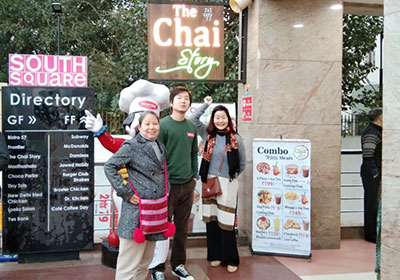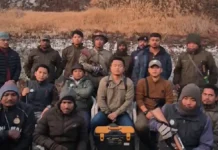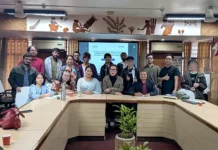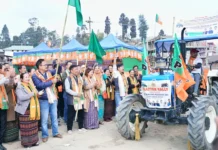
[ Tongam Rina ]
ITANAGAR, Apr 18: “The moment you join the service, you are at risk. There is always fear of infection, but it does not mean that we leave the patients alone,” says Dr Sajinglu Chai Pul, District Medical Officer, Lohit.
Defying all odds and resentment from all corners, Dr Chai Pul decided to admit Arunachal’s first Covid-19 positive patient on 2 April at the zonal general hospital in Tezu.
On 31 March, the Lohit administration was informed to trace the person, who had a history of travelling to Delhi.
A medical team, led by the DMO and the District Surveillance Officer, Dr S Towang, rushed to Medo, the village where the person resided, and took his swab sample for testing the same evening.
The person and his entire family were taken into quarantine.
It was an anxious wait for Dr Chai Pul and her team as they awaited the result from the Regional Medical Research Centre in Dibrugarh, Assam.
On the morning of 2 April, the result came positive.
Hell broke loose. The entire state reacted with horror and trepidation. Two organizations said that the patient should not be brought to Tomo Riba Institute of Health & Medical Sciences, the designated Covid-19 hospital, since it was not equipped.
One of the elected representatives even went to the extent of maligning the district administration, the police and the medical team on social media, stating that if the pandemic spread in Lohit, they would be held responsible.
Social media was already abuzz with hate, targeting a particular religion, since a photo of the family being taken to the quarantine facility was leaked by a friend of the person who later turned Covid-19 positive.
When the chaotic situation was getting out of control, with no time in hand, the Lohit district administration, the police and the medical team had to take a prompt call. They held a meeting with the Cultural and Literary Society of Mishmis (CALSOM) and other organizations, to ensure peace and allow the medical team to decide what was best for the patient.
Recollecting those tense few hours, Dr Chai Pul says, “For any doctor, the priority is treating the patient. As a doctor, I did what I had to do.”
Dr Chai Pul also had to convene a meeting with the medical personnel, as some were apprehensive about the quality of the personal protection equipment (PPE), and some were reluctant to do their duty without full protective gear.
“The safety of the medical team is of utmost importance; therefore I asked the team assigned to the isolation ward to wear two PPE and not to enter the ward unnecessarily,” Dr Chai Pul says.
The Lohit district administration and the DMO, along with the medical superintendent, had identified the isolation facility and the medical teams even before the first case was reported.
Dr Chai Pul says that the preparation helped the team immensely but more needed to be done.
Luckily for the team, more PPE arrived the night before the patient was admitted.
“That was a huge relief,” she says.
The World Health Organization had asked them to prepare for three months, following which eight teams, consisting of two doctors, four nurses, two sanitary attendants and four multitasking staffers, were formed. Since there were not enough staffers, Dr Chai Pul had to bring in employees from all over the district.
“Almost the entire malaria team of the district had to be roped in,” she says.
The first team worked a 10-day shift, before the next team took over. The teams are now under 14 days of mandatory quarantine.
“The patient was asymptomatic. We gave him vitamins but did not give him antibiotic. We had to focus on non-pharmaceutical intervention,” Dr Chai Pul says.
“The mental wellbeing of any patient is very important, so we engaged the services of clinical psychologist Osunam Pertin, who did a splendid job of counselling the patient as well as the medical team who attended to the patient,” she says.
She acknowledges the role of the CALSOM, which made sure that peace was maintained and the administration and the medical team were allowed to do their jobs without any outside interference.
She further says that her attending the sensitization training on Covid-19 organized by the health department in Naharlagun helped her prepare for any eventuality.
“The Covid-19 control room of the health service is always available for consultation, so every time there was any confusion, we made calls to the control room,” Dr Chai Pul says.
“Health Secretary P Parthiban, Home Commissioner Kaling Tayeng, and others were constantly there for any assistance,” she says.
She acknowledges the role of the Deputy Commissioner Prince Dhawan in making sure that everything was in place.
The DC, SP and she had to convene two more meetings with the public, even though it is not encouraged now, in order to allay the fear of the people.
“There is a lot of misinformation on social media and elsewhere, so we have to work really hard,” she says.
Dr Chai Pul calls social media a nuisance and a distraction that is really not constructive. On social media, it’s being circulated that the Tezu hospital has become a ghost house.
“We had to close down the OPD for medical reasons, but the flu corner is open during working hours and the casualty unit is open 24×7. Thirty-two children have been born in the hospital, including six cases of caesarian delivery, since the OPD was closed,” she says.
“We need to know our weakness. It helps in better planning and management,” she says. “Luckily for us, the patient was asymptomatic the entire time. Even in case there had been an emergency, we had a plan of action in place.”
How did she manage the pressure when the entire state was looking at her and the team?
“We have a very competent team,” she says. “I am an early riser, which gives me ample time to contemplate, and meditation helps,” says the doctor who finished her schooling from the government higher secondary school in Tezu in 1980. She did her MBBS course from Lady Harding’s Medical College, New Delhi.
Less than a year to retirement, Dr Chai Pul says that she has never seen a crisis of this scale in her entire career.
“It was hugely gratifying to see the patient virus-free,” she says.
“We are prepared for the future,” she says as she credits her team for taking care of the patient.
Her sister, Jaweplu Chai, Member Secretary, Arunachal Pradesh State Legal Services Authority, says that the family was a bit worried because of the chaotic situation, but there was no doubt whatsoever that she would pull it of.
“The patient could not be denied treatment. She is very devoted to the service,” Jaweplu says. “We started messaging her to take care of herself.”
Her other sister, Bapilu Chai Tawsik, an architect, says that “because of her calm and composed nature, she can handle any situation. She has the convincing capacity, which she has proved during this testing time when some insensitive citizens were putting pressure to shift the patient to some other place or else face the consequences in case something went wrong.”
As she faced the storm, the doctor did not forget to ask her sisters to contribute to the Rogi Kalyan Samiti of Tezu hospital, which they did.
She thanked her sisters for the contribution after the patient left the hospital on 17 April, cured.




